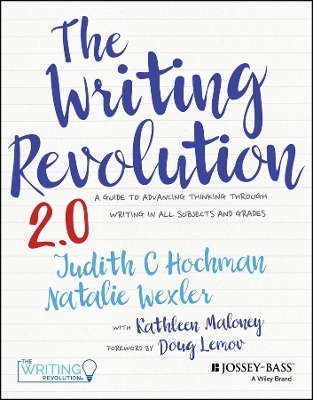
The Writing Revolution 2.0
Sybex Inc.,U.S. (Verlag)
978-1-394-18203-9 (ISBN)
Building on the success of the original best-seller, this new edition of The Writing Revolution adds valuable guidance for teachers seeking a way to bring their students' writing ability up to rigorous state standards. As thousands of educators have already discovered, The Writing Revolution provides the road map they need, clearly explaining how to incorporate the Hochman Method into their instruction, no matter what subject or grade they're teaching and regardless of the ability level of their students. The new edition provides a reorganized sequence of activities and even more student-facing examples, making it easier than ever to bring the method to your classroom.
The Writing Revolution isn't a separate curriculum or program teachers need to juggle. Rather, it is a method providing strategies and activities that teachers can adapt to their preexisting curriculum and weave into their content instruction. By focusing on specific techniques that match their students' needs and providing them with targeted feedback, The Writing Revolution can turn weak writers into strong and confident communicators. In addition, the method can:
Identify misconceptions and gaps in knowledge
Boost reading comprehension and learning
Improve organizational skills
Enrich oral language
Develop analytical abilities
The Writing Revolution takes the mystery out of teaching students to write well.
Judith C. Hochman is the founder of The Writing Revolution, a not-for-profit organization serving educators both in the United States and internationally. She is the former superintendent of the Greenburgh Graham Union Free School District in Hastings, New York, and the head of The Windward School in White Plains, New York. Dr. Hochman is the founder of the Windward Teacher Training Institute and the author of many articles and books on the topic of writing. Natalie Wexler is the author of The Knowledge Gap: The Hidden Cause of America’s Broken Education System—And How to Fix It. She has a Substack newsletter, Minding the Gap, and her writing on education has appeared in the Atlantic, the Washington Post, the New York Times, and other publications. She was the host of the first season of the Knowledge Matters Podcast, a six-episode series called Reading Comprehension Revisited. Kathleen Maloney is the chief operating officer of The Writing Revolution, where she brings her passion for literacy and experience in education to her role, overseeing the organization’s daily operations and strategizing its future direction in collaboration with the co-CEOs. Before joining the team, she was an English teacher and literacy coach using The Hochman Method in her own classroom and leading its school-wide implementation.
Dedication ix Acknowledgments x
About the Authors xi
Foreword xiii
Letter to Readers xxiii
Chapter 1: Introduction: Why You Need a Writing Revolution in Your Classroom 1
SECTION I: Sentences
Chapter 2: Sentences: Learning the Fundamentals 31
Chapter 3: Sentence Expansion and Note-Taking: Elaborating on Information 45
Chapter 4: Sentences: Introducing Variety and Complexity 67
SECTION II: Writing at Length
Chapter 5: Planning before Writing: Determining the Shape of What’s to Come 113
Chapter 6: A Simple, Linear Guide: Introducing the Single-Paragraph Outline 125
Chapter 7: Revision: Putting It All Together 157
Chapter 8: Summarizing: Finding the Main Idea of a Text 177
Chapter 9: Moving On to Compositions: The Transition Outline and the Multiple-Paragraph Outline 187
Chapter 10: Taking a Stand: Writing Opinion, Pro/Con, and Argumentative Essays 227
SECTION III: How to Assess Writing and Adapt the Hochman Method to Your Classroom
Chapter 11: A Gauge and a Guide: Assessing Students’ Writing 263
Chapter 12: Revolutionizing Learning: Embedding Writing Activities into Content 279
Chapter 13: Putting the Method into Practice: Leave No Strategy Behind 289
Appendixes
A. Expository Writing Terms 309
B. Abbreviations and Symbols 311
C. Transition Words and Phrases 312
D. Proofreading Symbols 313
E. Student Revise and Edit Checklist 314
F. Writing Assessment Checklists 315
G. Single-Paragraph Outline 321
H. Single-Paragraph Outline (Book Report) 322
I. Summary Sentence 323
J. Pre-Transition Outline (2 Paragraphs) 324
K. Pre-Transition Outline (3 Paragraphs) 325
L. Transition Outline (3 Paragraphs) 326
M. Transition Outline (4 Paragraphs) 327
N. Transition Outline (5 Paragraphs) 328
O. Multiple-Paragraph Outline (3 Paragraphs) 329
P. Multiple-Paragraph Outline (4 Paragraphs) 330
Q. Multiple-Paragraph Outline (5 Paragraphs) 331
R. Multiple-Paragraph Outline (Book Report) 332
Glossary 333
| Erscheinungsdatum | 04.07.2024 |
|---|---|
| Co-Autor | Kathleen Maloney |
| Vorwort | Doug Lemov |
| Verlagsort | New York |
| Sprache | englisch |
| Maße | 216 x 274 mm |
| Gewicht | 748 g |
| Themenwelt | Schulbuch / Wörterbuch ► Wörterbuch / Fremdsprachen |
| Geisteswissenschaften ► Sprach- / Literaturwissenschaft ► Sprachwissenschaft | |
| Sozialwissenschaften ► Pädagogik | |
| ISBN-10 | 1-394-18203-1 / 1394182031 |
| ISBN-13 | 978-1-394-18203-9 / 9781394182039 |
| Zustand | Neuware |
| Informationen gemäß Produktsicherheitsverordnung (GPSR) | |
| Haben Sie eine Frage zum Produkt? |
aus dem Bereich


